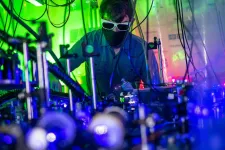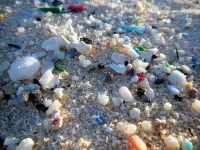INFORMATION:
The research was published recently in the Journal of Public Economic Theory.
UBCO economist says private security systems bar others from protection
Economically speaking, these systems only benefit a certain segment of society
2021-03-01
(Press-News.org) New research has determined the prevalence of private security systems may be robbing the general public of the police services they need.
Dr. Ross Hickey is an economist in UBC Okanagan's Faculty of Management and the Irving K. Barber Faculty of Arts and Social Sciences. Along with a team of researchers, Hickey examined data from a social survey of Canada victimization, where people answered whether they had added security measures to their homes to protect themselves from crime.
"We are seeing more expenditures on private security systems installed in homes and, as economists, we have to ask why. We know that crime rates are down and expenditure on police is up," says Hickey. "But private security purchases are at an all-time high."
Hickey says the research team first thought about the classic supply and demand equations. The government provides the supply, or resources, for policing and there is a demand for public protection. However, when you combine a supply of private security products, then add criminals to the mix, Hickey says the basic supply and demand equation doesn't add up.
There are many different types of security measures people can take--anything from putting bars on windows to getting a dog, or adding motion-detection lights, house alarms and security cameras. And while they may make people feel more secure, it's also been proven that a barking dog may deter a thief more effectively than cameras and alarms. Hickey says security systems that automatically alert police, even though it may be a false alarm, can divert police from other duties.
"All of these innovations in private security don't prevent the crime, they increase the chances of the person getting caught. When the police are called to homes using these technologies, we see the police being taken away from responding to another, perhaps, more urgent call," says Hickey.
Hickey says their research demonstrates a classic case of inequity between segments of society.
"This is a dimension of inequity that doesn't show up directly," he says. "The inequity is in how some people are accessing this public good. It is available for everybody but some people are getting more of it, because they have chosen to install these private systems. And police are responding to those systems."
The research, says Hickey, means that municipalities should consider police budgets differently than they currently do. Right now, just adding more money to the system does not change the inequity that will continue with the prevalence of home security systems.
"We need to think more carefully about this. In a world where private security investments are happening, we may need to look at different methods of funding the police," he says.
Hickey says just adding extra funding into the mix is not the solution. Currently, people are not being uniformly protected by police services. And the police are being drawn toward particular segments of society who have privately invested in their own home protective measures.
"Are the people with lower incomes, or those living on the street, getting the same service from police? And we have to ask--if the city adds more police services next year, is that really going to make downtown much safer?"
ELSE PRESS RELEASES FROM THIS DATE:
Low-level thinning can help restore redwood forests without affecting stream temperatures
2021-03-01
CORVALLIS, Ore. - Selectively cutting trees in riparian zones to aid forest restoration can be done without adversely affecting streams' water temperature as long as the thinning isn't too intensive, new research by Oregon State University shows.
Published in PLOS One, the study led by OSU College of Agricultural Sciences graduate student David Roon is one of the few to quantify restorative thinning's effects on forest streams.
"We don't know much about what happens with the more subtle changes in shade and light that come with thinning," Roon said. "Most of the research so far has looked at the effects of clearcutting with no stream-side buffer at all, or harvests outside of an untouched buffer area. And regulatory requirements ...
How 'great' was the great oxygenation event?
2021-03-01
Around 2.5 billion years ago, our planet experienced what was possibly the greatest change in its history: According to the geological record, molecular oxygen suddenly went from nonexistent to becoming freely available everywhere. Evidence for the "great oxygenation event" (GOE) is clearly visible, for example, in banded iron formations containing oxidized iron. The GOE, of course, is what allowed oxygen-using organisms - respirators - and ultimately ourselves, to evolve. But was it indeed a "great event" in the sense that the change was radical and sudden, or were the organisms alive at the time already using free oxygen, just at lower levels?
Prof. Dan Tawfik of the Weizmann Institute of Science's Biomolecular Sciences Department explains that the dating of the GOE ...
Bottling the world's coldest plasma
2021-03-01
HOUSTON - (March 1, 2021) - Rice University physicists have discovered a way to trap the world's coldest plasma in a magnetic bottle, a technological achievement that could advance research into clean energy, space weather and astrophysics.
"To understand how the solar wind interacts with the Earth, or to generate clean energy from nuclear fusion, one has to understand how plasma -- a soup of electrons and ions -- behaves in a magnetic field," said Rice Dean of Natural Sciences Tom Killian, the corresponding author of a published study about the work in Physical Review Letters.
Using laser-cooled strontium, ...
Visiting water bodies worth £700bn to economies, study finds
2021-03-01
Europeans spend more than £700 billion (€800bn) a year on recreational visits to water bodies - but perceived poor water quality costs almost £90 billion (€100bn) in lost visits, a new study has found.
The new research - led by a European collaboration involving the University of Exeter and the University of Stirling - used data from 11,000 visits in 14 different countries to analyse the economic value of water bodies, such as rivers, lakes, waterfalls, beaches and seaside promenades.
The research team estimated that people spend an average of £35 (€40) travelling to and from these sites, with a typical family making 45 such trips each year.
The team also found ...
Microplastic sizes in Hudson-Raritan Estuary and coastal ocean revealed
2021-03-01
Rutgers scientists for the first time have pinpointed the sizes of microplastics from a highly urbanized estuarine and coastal system with numerous sources of fresh water, including the Hudson River and Raritan River.
Their study of tiny pieces of plastic in the Hudson-Raritan Estuary in New Jersey and New York indicates that stormwater could be an important source of the plastic pollution that plagues oceans, bays, rivers and other waters and threatens aquatic and other life.
"Stormwater, an understudied pathway for microplastics to enter waterways, had similar or higher concentrations of ...
The right '5-a-day' mix is 2 fruit and 3 vegetable servings for longer life
2021-03-01
DALLAS, March 1, 2021 — Studies representing nearly 2 million adults worldwide show that eating about five daily servings of fruits and vegetables, in which 2 are fruits and 3 are vegetables, is likely the optimal amount for a longer life, according to new research published today in the American Heart Association’s flagship journal Circulation.
Diets rich in fruits and vegetables help reduce risk for numerous chronic health conditions that are leading causes of death, including cardiovascular disease and cancer. Yet, only about one in 10 adults eat enough fruits or vegetables, according to the U.S. Centers for Disease Control and Prevention.
“While groups like the ...
Single cell sequencing opens new avenues for eradicating leukemia at its source
2021-03-01
A new method, described in a study published today in the journal Nature Communications, has the potential to boost international research efforts to find drugs that eradicate cancer at its source.
Most cancerous tissue consists of rapidly dividing cells with a limited capacity for self-renewal, meaning that the bulk of cells stop reproducing after a certain number of divisions. However, cancer stem cells can replicate indefinitely, fuelling long-term cancer growth and driving relapse.
Cancer stem cells that elude conventional treatments like chemotherapy are one of the reasons ...
'Overwhelming' international support for more government action on environment, message-testing experiment finds
2021-03-01
With eight months to go before the UN Climate Change Conference (COP26), an international survey experiment has found evidence of "overwhelming" support across seven major countries for governments to "do more" to protect the environment.
The survey directly asks the public about policies they want to see backed by governments at COP26, when the UK and Italy will gather world leaders in Glasgow from 1 November to commit to urgent global climate action.
Researchers at the University of Cambridge worked with polling agency YouGov on a message-testing experiment involving 14,627 adults, with ...
Top diversity and equity leaders in psychiatry offer guidelines for academic medicine
2021-03-01
Diversity, equity and inclusion (DEI) leaders in academic medicine are subject to increasing expectations with limited resources and there is an urgent need for psychiatry departments to commit to fully supporting their efforts, according to an article now available in the American Journal of Psychiatry written by top DEI leaders in academic psychiatry from across the country.
The authors, representing prominent public and private institutions, include Ayana Jordan, M.D., Ph.D., Yale University, and current APA ECP Trustee-at-Large; Ruth S. Shim, M.D., M.P.H. University ...
Why COVID-19 vaccine distribution methods fall short and 3 ways to improve them
2021-03-01
BINGHAMTON, NY - Several proposals have emerged on how to distribute the COVID-19 vaccine, but they fall short in ensuring that the vaccine is distributed fairly. A team including Binghamton University professor Nicole Hassoun suggests three ways to more fairly and effectively distribute the vaccine so that people in poor countries get the vaccine as soon as possible.
"Although many people in rich countries will receive a vaccine for COVID-19 this year, many people in poor countries will likely have to wait years to get one," said Hassoun. "Ethical vaccine allocation requires closing this gap and ensuring that everyone can access a vaccine ...
LAST 30 PRESS RELEASES:
New study from Jeonbuk National University finds current climate pledges may miss Paris targets
Theoretical principles of band structure manipulation in strongly correlated insulators with spin and charge perturbations
A CNIC study shows that the heart can be protected during chemotherapy without reducing antitumor efficacy
Mayo Clinic study finds single dose of non-prescribed Adderall raises blood pressure and heart rate in healthy young adults
Engineered immune cells show promise against brain metastases in preclinical study
Improved EV battery technology will outmatch degradation from climate change
AI cancer tools risk “shortcut learning” rather than detecting true biology
Painless skin patch offers new way to monitor immune health
Children with poor oral health more often develop cardiovascular disease as adults
GLP-1 drugs associated with reduced need for emergency care for migraine
New knowledge on heritability paves the way for better treatment of people with chronic inflammatory bowel disease
Under the Lens: Microbiologists Nicola Holden and Gil Domingue weigh in on the raw milk debate
Science reveals why you can’t resist a snack – even when you’re full
Kidney cancer study finds belzutifan plus pembrolizumab post-surgery helps patients at high risk for relapse stay cancer-free longer
Alkali cation effects in electrochemical carbon dioxide reduction
Test platforms for charging wireless cars now fit on a bench
$3 million NIH grant funds national study of Medicare Advantage’s benefit expansion into social supports
Amplified Sciences achieves CAP accreditation for cutting-edge diagnostic lab
Fred Hutch announces 12 recipients of the annual Harold M. Weintraub Graduate Student Award
Native forest litter helps rebuild soil life in post-mining landscapes
Mountain soils in arid regions may emit more greenhouse gas as climate shifts, new study finds
Pairing biochar with other soil amendments could unlock stronger gains in soil health
Why do we get a skip in our step when we’re happy? Thank dopamine
UC Irvine scientists uncover cellular mechanism behind muscle repair
Platform to map living brain noninvasively takes next big step
Stress-testing the Cascadia Subduction Zone reveals variability that could impact how earthquakes spread
We may be underestimating the true carbon cost of northern wildfires
Blood test predicts which bladder cancer patients may safely skip surgery
Kennesaw State's Vijay Anand honored as National Academy of Inventors Senior Member
Recovery from whaling reveals the role of age in Humpback reproduction
[Press-News.org] UBCO economist says private security systems bar others from protectionEconomically speaking, these systems only benefit a certain segment of society



